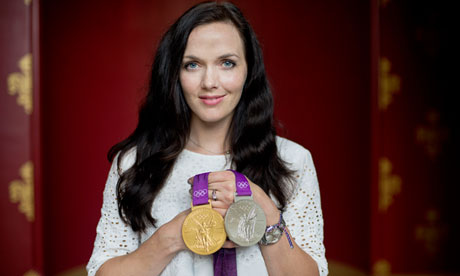
It starts, as it so often does, in the historical present. The reigning world champion Victoria Pendleton is here, reporting live from the Laoshan velodrome in Beijing just before the Olympic final of the individual sprint. She's riding a bike that is sitting on rollers, and as she pedals she recaps her life as it converges on this one defining point. Shortly after getting off the rollers, she will win gold. Twenty-four hours later, she will have a row with the leaders of British Cycling about her relationship with one of their support staff. Halfway through the row, she will plunge a pair of nail scissors into her arm, drawing blood, the better to emphasise her point.
There are strict formal conventions to the writing of sports biography. First chapters should start at the critical moment – the first match, the fall from grace, the thank-God retirement – and then, just as the subject walks down the tunnel into the blinding white light of their future, the chapter should end. Then it's straight into past-life regression: childhood, parents, first time on a bike or a playing field, rows with siblings and trainers, defeats, races, kisses, calamities. And so on, all heading back towards that single moment and its pivotal epiphany.
When the formula works, it works brilliantly. Andre Agassi's Open abides by all those rules, but it's still a sublime up-all-night read. Within cycling, David Millar, Chris Hoy, Lance Armstrong and their respective ghosts all mastered it beautifully. But when the book is a rush-job, hoping to coast on the afterglow of a specific event, then it works less well.
Victoria Pendleton is known for being the emotional one, the woman within Team GB who remained firmly a girl. She likes clothes and makeup, she goes into full-scale super-fan meltdown when she meets the Foo Fighters' singer Dave Grohl, and – unlike her great rival, the Australian sprinter Anna Meares – she is not built like a bike shed. But her father expected her to act like a man, and she is clearly bitter both about the disparity in opportunities between the sexes and the attention given to her peers. "I had three minutes before the focus shifted," she writes after winning gold in Beijing. "And then ... the eyes and the lenses turned elsewhere. They moved away from me to the giant shadow of Chris Hoy."
The psychologist Dr Steve Peters tells Pendleton that she is there to race for three groups of people: her friends, her enemies, and her public. At times, Pendleton's list of enemies looks a lot bigger than her list of friends (after Beijing and the nail-scissors incident, the supporters club appears to have been reduced to her mum and her boyfriend). In the brief moments when she isn't ripping chunks off Anna Meares, she's obsessing about the lack of support within Team GB, writing unsent letters to "disapproving individuals" or complaining that people seem to expect her to be some sort of spokeswoman for women's cycling.
Like Agassi with tennis, Pendleton grows to hate cycling. Bikes themselves begin to seem like instruments of self-harm and her relationship with pain degrades. She tries to retire in 2010 but is persuaded to stay on until the London Olympics. She starts a relationship with performance analyst Scott Gardner and is ostracised for it. When she goes to a tattooist to get the words "Today is the greatest day I've ever known" inked into her forearm, "the pain was disappointingly slight". Though the press loves her because she's always either crying or taking her clothes off, the rest of Team GB aren't impressed. "I think (Vicky) measures her success by how much attention she gets," she quotes Chris Hoy as saying, more in sadness than in anger.
Retirement into a world of Strictly and dobermans cannot come too soon for Pendleton – or, you sense, her ghostwriter, the Guardian sports journalist Donald McRae. All sporting careers are by their nature repetitious; the point of being a great athlete, after all, is to get good at doing one thing, often. But when, as Pendleton points out, your day-job consists of riding around a big room in circles, "like crazy people on bikes without brakes ... churning and turning (y)our legs in quiet desperation," and then those repetitions are turned round and round in print, a definite sense of deja vu begins to set in, both for reader and for rider.
That same sense of hurtling towards a longed-for ending pervades the final chapters of this book. The formula conforms, as it always does (she gets her second gold and walks out towards the lights), but in Pendleton's case, you really do end up wondering if it's going to be happy ever after.
Bella Bathurst is the author, most recently, of The Bicycle Book

